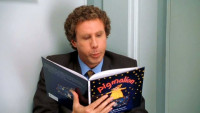
My Novel Was Rejected By 41 Literary Agents Before Becoming a Bestseller. Here are 8 Truths About Perseverance I Want Everyone With a Big Dream to Know
mariashriversundaypaper.com – Sunday May 28, 2023

When I tell my story, it’s the ending that gets attention.
New York Times bestselling author! Both of my books are being turned into movies! I’m adapting my first novel for the screen! Five separate seven-figure deals!
It’d be easy to conclude that with all that incredible success, the path to get here must have been smooth and clear.
Nothing could be further from the truth.
As a young twentysomething, I spent years pursuing my Broadway dreams in New York, which ended with me and my embarrassingly thin resume buying a one-way ticket back home to Arizona. My mid-twenties were spent sleeping in the twin bed in my childhood bedroom at my parent’s house, trying to figure out what a person with a degree in musical theatre (who failed at working in musical theatre) was supposed to do with the rest of her life. For years, I wrote “figure out my life” on every to-do list I created. I meant it sincerely. It never got scratched off.

I tried the AI novel-writing tool everyone hates, and it’s better than I expected
theverge.com – Wednesday May 24, 2023

Last week, generative fiction tool Sudowrite launched a system for writing whole novels. Called Story Engine, it’s another shot in the ongoing culture war between artists and AI developers — one side infuriated by what feels like a devaluation of their craft, the other insisting that it’s a tool for unlocking creativity and breaking writer’s block. Neither answered the question I was really curious about: does it work?
Well, I didn’t take on Sudowrite’s pitch of a full novel in a few days. But over the weekend, I generated a novella written entirely inside Story Engine — it’s called The Electric Sea at the AI’s suggestion, and you can read the whole thing on Tumblr.
I’m not sure how I feel about it.
I’m an enthusiastic, if strictly amateur, fiction writer. I wrote somewhere north of 150,000 words of unpublished fiction last year, so Sudowrite’s “break writer’s block” pitch isn’t that compelling to me. Writing, however, is not a task I hold inherently sacred. The field has a long and proud tradition of hastily written profit-driven trash, from Ed Wood’s churned-out erotica to the infamous pulp publisher Badger Books, known for handing authors a cover and asking them to write a book around it. I enjoy seeing where large language models’ strengths and weaknesses lie, and I’ve long been fascinated by challenges like NaNoGenMo, which asked writers to create an AI-generated novel in the days before modern generative AI. So on Saturday morning I paid for 90,000 words of Sudowrite text, booted it up, and “wrote” a roughly 22,500-word cyberpunk novella by Sunday afternoon.

5 Tips on Finding a Literary Agent For the Book You've Written
houstonpress.com – Monday May 22, 2023

When I teach my Intro to Fiction Writing class at Closing Credits, I always start by telling students what to expect in the world of publishing. There’s not much point in writing a book if you don’t know what you’re going to do with it. Inevitably, we end up talking about agents, the gatekeepers of traditional publishing. Here are some tips I hand out.
Figure Out If You Really Need an Agent
I don’t mean “ go straight to the publishers.” They will throw your work in the trash. I mean, is your work better suited for self-release?
The example I always use is Chuck Tingle. There was always a market for weirdly-worded dinosaur erotica with badly-photoshopped covers and overt political commentary, but no agent was ever going to be able to sell that. The industry is focused on a handful of surefire moneymakers. It turns on a $100 bill, not a dime.
If your work is particularly weird or off the beaten path, you may be better off investing in yourself. Agents are for market-ready works.

Even Without Book Bans, Publishing Has a YA Issue
themarysue.com – Sunday May 21, 2023

Young Adult (YA) literature has found itself under attack from an increase in book banning and censorship. Right-wing groups like Moms for Liberty have set their sights on YA literature, and have succeeded in removing countless titles from school districts and local libraries. Some of the most common targets are books that address topics like abuse, racism, and LGBTQIA issues. Right-wing groups raise outrage by wrongfully classifying YA books as “pornography” to make them inaccessible to readers of all ages. However, book banning is only part of the genre’s continued fight for survival.
Those who oppose YA literature are definitely part of the problem, but those who support it may also be unintentionally harming it. So many adults are reading, publicly reviewing, and commenting on YA literature that YA books are now tailored to adults instead of teens. There’s also the issue of adult books mislabeled as YA literature, and vice versa. The problem isn’t that kids can’t read or handle any content deemed “adult.” It’s that adults and young readers are two completely separate markets, and the needs and interests of each ought to be evaluated separately. Additionally, price hikes in books make YA literature inaccessible to their target audience.

The 'publishing less' conundrum
thebookseller.com – Thursday May 18, 2023

Yes, publishers are overstretched — but fewer books won’t really help.
Do we need to care for authors better, rethink staff workloads and pay more attention to each book? Yes. But the short answer to "can we publish less, but better?" is: not necessarily.
Most would agree we don’t want lists reduced, teams shrunk and only safe titles published. This wouldn’t be serving readers, writers, the industry or society. So what we need is a situation where authors are better communicated with, books are given more attention, and the changed nature of publishing roles is recognised.
As someone who has tried to do exactly that, from the luxury of a fresh start with a new company, it’s worth highlighting our aims and our realisations.

How to get published in a literary magazine: ‘Whatever excites you will excite us’
irishtimes.com – Sunday May 14, 2023

Gemma Tipton offers a beginner’s guide to taking up a new cultural pursuit
If there was an Olympics for philosophical musings, Ireland’s Chat Team would surely win gold. Some get their deep thoughts down on paper, but how do you take the next step and get it in print? Lisa McInerney is editor of the Stinging Fly.
Aren’t literary magazines for people who write stuff that’s hard to read?
Absolutely not. Danielle McLaughlin says she credits the Stinging Fly with enabling her to be a writer today, “something that would once have seemed as remote a possibility as becoming an astronaut”, while Anne Enright says, when people ask her how to break into publishing, she tells them “try there first”.

What Teaching Shakespeare Taught Me About Writing Horror
lithub.com – Monday May 8, 2023

Titus Andronicus May Be Bloody, but the Scottish Play and Othello Are Psychological Horror Perfection
A desolate moor, haunted by incomprehensible supernatural beings. Chains rattling in a dark castle, ghosts prowling the ramparts. A grisly corpse, hands chopped off and tongue sliced out. For any horror-lovers, whether the Gothic classics or the contemporary greats, these tropes will ring familiar.
They come, of course, from Shakespeare.
In fact, after more than a decade of teaching his work, I’ve come to see Shakespeare—at least when he’s writing tragedies—as primarily a horror writer. He might perhaps be the most significant influence in the entire English language to the Gothic, and consequently the modern, horror tradition.
On the surface, no play epitomizes this more than his first tragedy, the grisly Titus Andronicus. It is the Saw franchise of Elizabethan theatre, filled with as much shock and gore as Shakespeare could possibly have packed into a single play. As well as a full complement of stabbings, hangings, and beheadings, the audience is treated to Aaron being buried up to his neck until he starves to death, seeing Lavinia’s hands removed and tongue cut out, watching on as Alarbus’s arms and legs are cut off and he is thrown into a fire, and finally, Shakespeare delivers the coup-de-grace as Chiron and Demetrius are baked into a pie and then fed to their mother. Let it not be said that gore is a new thing in popular entertainment.

Jaime Green on Writing with Research
lithub.com – Saturday April 29, 2023

I realized early on that what I loved about writing nonfiction was the finding. Digging some marvel out of a dusty corner and giving it a good wipe-down, holding it up so the reader can see how it catches the light. Look at that!
The item is always in the light, not me. The thrill of the jackpot in research entranced me, as did the satisfaction of setting the artifact in the perfect frame of an essay. Instead of puzzle pieces with only one solution, the research was mosaic tiles, making a different picture if you placed them this way or that. I thought, for a while, that was my art.
But it’s a choice, of course, how visible a writer makes their research. Not the information found, but the act of finding. And not the credit and citation—that’s not a flexible requirement—but whether the sourcing lives in your prose instead of just the back of the book. You do get to decide.

I'm a poet. And I celebrate the days I write nothing
wbur.org – Friday April 28, 2023

During the 30 days of April, poetry, normally not-in-the-limelight, earns a hashtag: it’s #NationalPoetryMonth. It's as though Emily Dickinson has won a Publisher's Clearinghouse prize. There's a major uptick in poems studied, written, performed, and published as poetry becomes the focus of national educational organizations and local community arts counsels, heralded by U.S. Presidents and English language arts teachers alike.
I've been writing and publishing poetry since I was 15. It's usually a quiet gig. Come April, though, my day planner is flooded with readings, public appearances, online events, interviews and contests to establish or judge — and I'm only a state poet laureate. I can't imagine what U.S. Poet Laureate Ada Limon's calendar looks like for those four weeks. All this fanfare for a genre that won't be touched by most literary agents.
AI is no Shakespeare. Why ChatGPT, other tools are unlikely to take your writing job
eu.usatoday.com – Sunday April 16, 2023
“Shakespeare’s not such a great writer,” a fellow student said during an English class years ago. “His stuff is lazy! There’s one cliché after another.”
Certainly, the then-teen could be forgiven for thinking that the playwright William Shakespeare phoned it in, so to speak. His plays are peppered with phrases that are now clichés. “My own flesh and blood,” “cruel to be kind” and “method to my madness” are a few from “Hamlet” alone.
But those tidbits weren’t clichés before Shakespeare. They didn’t exist until everyone saw that his phrasing was so imaginative and poignant they couldn’t resist adopting them.
The distinction between turning a phrase and borrowing one is critical to gauging where generative AI is heading, and what threats and opportunities it may present for the future of human composition.
Get the free newsletter | Submit a news item or article | Get Writers' News for your website





